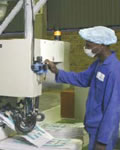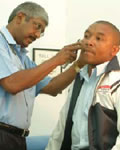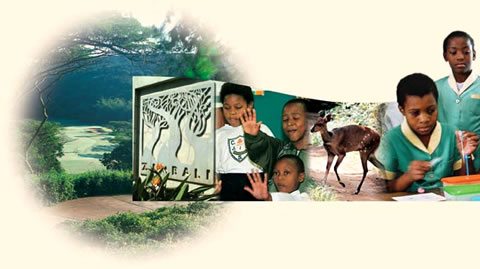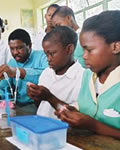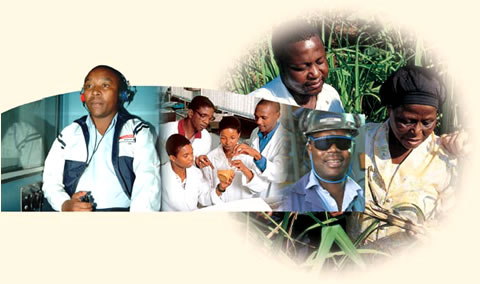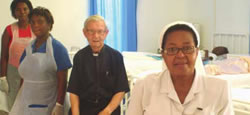Sustainability Report
OVERVIEWTongaat-Hulett is committed to the principles of sustainable development and their integration into all aspects of our business activities. We are committed to realising value for our stakeholders, performing responsibly in relation to the physical and social environment and to acting with the highest ethical and moral standards. GOVERNANCE STRUCTURESThe board of Tongaat-Hulett has appointed committees for safety, health and environment, remuneration and employment equity. These are detailed in the corporate governance report. In addition, there are action groups that function Group wide on black economic empowerment, corporate social investment and human resources development.
Action is being taken at all operations to improve safety performance and to reduce the lost time injury frequency rate (LTIFR). Since January 2003, the LTIFR includes all restricted work cases which was not the case in previous years. The LTIFR has improved during 2003 from 1,56 in the first quarter to 0,90 in the fourth quarter. Tongaat-Hulett Sugar and Hulett Aluminium improved their LTIFR to 0,90 and 0,41 respectively in the last quarter of 2003. The total recordable case frequency rate (TRCFR) for 2003 was 2,36 compared to 6,05 in 2002. The TRCFR covers lost time injuries (including restricted work cases), medical treatment cases and fatalities. Tongaat-Hulett has a zero fatalities target. Regrettably five employees in the sugar operations lost their lives during the past year – three in Zimbabwe, one in Mozambique, and one in South Africa. In Zimbabwe, two employees were murdered whilst on duty guarding company property and one death occurred in a tractor accident. In Mozambique, a fatal accident happened when a sugar stack collapsed onto the deceased. In South Africa, a contractor died after falling under a reversing delivery vehicle. The cause of every fatal incident is carefully reviewed and rigorously investigated at executive level. Incident reports are tabled at board level and widely disseminated and discussed to avoid similar tragedies. All lost time injuries and minor injury trends also receive close scrutiny and follow up in each operation. Tambankulu Estates in Swaziland achieved NOSCAR (National Occupational SHE Accredited Award) status, the first operation in the sugar industry to obtain the premier NOSA award. The mill at Darnall holds a four-star Platinum NOSA grading, while Felixton, Maidstone, Refinery, Agricultural operations (SA) and Voermol Feeds have all achieved three star ratings. All African Products mills are implementing the OHSAS 18001 which is an occupational health and safety management system with Kliprivier attaining SABS accreditation in 2003. The OHSAS 18001 regime complements African Products' existing ISO 14001 environmental and ISO 9000:2000 quality management systems. The other mills at Germiston, Meyerton and Bellville are at various stages of OHSAS 18001 certification compliance.
Malaria remains a significant health risk in our operations in Swaziland, Mozambique and Zimbabwe. The relevant operating centres practice an integrated malaria control programme that includes awareness, environmental control measures, indoor spraying with residual insecticides, personal protection measures, early recognition and diagnosis, and treatment. Group clinics and first aid centres, with qualified occupational health staff and visiting part-time doctors, support occupational health initiatives and objectives. All operations have employees trained in first aid.
In Tongaat-Hulett Sugar's operations, Tambankulu, Maidstone, Felixton and Agriculture have achieved ISO 14001 certification with Amatikulu, Voermol and Darnall on schedule for certification in 2004. Traditionally a major user of its own “green” energy, Tongaat-Hulett Sugar is in the process of enhancing co-generation initiatives. Recent developments include an expressed willingness by Eskom to enter into negotiations regarding co-generated power pricing and the establishment of a renewable energy power pool by an independent power producer. Hulett Aluminium's integrated effluent treatment plant has reduced the risk of accidental pollution and has also improved the quality of discharges. Improved efficiencies have been realised in the gas firing of remelt furnaces, while reduced electricity consumption and significant cost savings have been achieved by aligning demand with equipment planning. Moreland's environmental policy is underwritten by environmental impact assessments and environmental management plans for each project. Its efforts are governed by a four-pronged strategy – to exceed minimum legal requirements, being advised by leading experts, working with recognised conservation bodies, and communicating its environmental activities. Moreland has established an industry-leading practice on the sustainable development and conservation of natural assets under its control at the Zimbali Coastal Resort. Underpinned by a sensitive approach to development, the Mhlanga Forest Estate will serve as an example of how a project can benefit the natural environment, add value to society, and help facilitate the managed conservation of more than 300 hectares of the prime Hawaan coastal forest and Ohlanga lagoon area.
The objective of BEE procurement is to assist in the promotion of black businesses by ensuring that black suppliers have access to the Group's supply chain and that procurement is consistent with government strategy on broad-based economic empowerment. BEE procurement spend is measured on a quarterly basis across all operating companies and is grouped into three categories – capital, consumables (including raw materials), and services. Total BEE procurement spend for the year amounted to R522 million, representing 15 percent of total available spend, which is defined as total procurement spend, less spend on parastatals, key raw materials and imported expenditure. Targets have been set for the Group that includes 25 percent of available expenditure being spent with BEE entities by the end of 2008. Hulett Aluminium increased its BEE procurement spend by 25 percent to R169 million year-on-year and grew its support of African-owned or African joint venture suppliers over 2002 by 43 percent to R117 million. African Products procurement initiatives resulted in BEE spend of R38 million exceeding the target of R30 million by over 25 percent. This trend is likely to accelerate with a greater focus on procuring maize from emerging farmers. Tongaat-Hulett Sugar sold 2 073 hectares of its land to historically disadvantaged individuals during the year with a further 1 617 hectares earmarked to be sold in 2004. Thus far, 7 356 hectares have been sold to emerging growers with 22 new freehold farmers currently undergoing a mentorship programme to ensure the project's sustainability. Moreland's continuing involvement in major land development projects in Durban, mainly in the Northern coastal corridor has resulted in increased development expenditure and consequently a higher BEE contribution. Its total own contributions through direct and indirect outsourcing to BEE contractors for the year ended 2003 amounted to more than 37 percent of total development expenditure whilst collective contributions by all related entities amounted to R240 million – Durban's uShaka Marine World and Point Development Projects making a contribution of R201 million.
A major highlight of 2003 was the racial mix achieved throughout the Group - Africans, Coloureds and Indians comprise 22 percent in top management, 33 percent in senior management, 50 percent in middle management, and 76 percent in skilled and supervisory positions. Group wide strategies are in place to address the representation of women and Africans at senior levels at each of the four operating companies. A natural corollary of our equity programme is the training and development of our people. Achievements in this area include the introduction and management of 31 learnerships in compliance with the Skills Development Act and 204 employees are currently studying towards tertiary level qualifications. We have also introduced talent management processes to optimise the contribution of our high potential people and to ensure that they are retained. These processes include a review of the performance and potential of employees against the desired future competency profile required to meet strategic business priorities. Action plans are developed to address gaps, and include measures that gauge current and future potential against desired performance. We pride ourselves on the maintenance of constructive and mature relationships with employees and unions. This is confirmed by the existence of a stable industrial relations environment during the last few years.
VALUE ADDED ANALYSISfor the year ended 31 December 2003 The following statement shows how value added, or wealth created, by the Group has been applied, first to reward those responsible for its achievement, secondly in payments to the providers of the Group’s capital, thirdly in the payment of taxes, and finally, the amount re-invested in the business to finance replacement and growth.
The Group wide team responsible for our corporate social initiatives has a comprehensive social investment plan that is focused on education, health, community skills upliftment, welfare, environment and crime prevention. One of the key community projects supported by Tongaat-Hulett is the Business Trust where we have committed R5 million over a five-year period. The Business Trust is managed by the National Business Initiative and is engaged with development, education, training, job creation and tourism marketing. Investments have also been made in education infrastructure, support services and the provision of computer facilities. Education, with the emphasis on science and technology, and health are the major beneficiaries of our initiatives and schools and healthcare projects have received funding. These include the Programme for Technological Careers (Protec) which is aimed at disadvantaged learners from grades 10 to 12 and endeavours to develop technical, business management and leadership skills. In this respect, two grade 12 students at Protec Tongaat were awarded full bursaries to study chemical and electrical engineering at Wits University. Another grade 12 student attained an exemption with four distinctions, while four more students achieved merit exemptions. HIV/AIDS continues to receive attention in view of the serious socio-economic consequences of the pandemic. One of the HIV/AIDS projects initiated by Tongaat-Hulett is Sukumawenze, a place of care that looks after terminally ill patients. The Group financed the construction of Sukumawenze, which means stand up and do something for yourself, through a Tongaat-based BEE company. Run by Sister Mary-Anne Mkhize, Sukumawenze fulfils its mission with compassion and dignity in Inanda, near Durban. CONCLUSIONWe believe that the sustainability of our business lies firmly in the hands of our people, as they are the greatest source of our competitive advantage. This also manifests itself in our holistic approach in pursuit of the triple bottom line, translating to the achievement of a balanced and integrated economic, social and environmental performance. Tongaat-Hulett contributes towards meaningful improvement and enhancement of the quality of life of our people and their communities by implementing leading practices in all areas of our business. |
